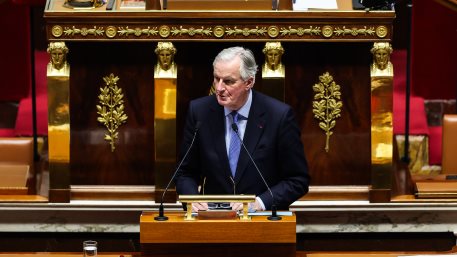
Several days have already passed since the borderline grotesque scenes at the Capitol Hill in Washington, enough time for the public to start taking in the deeper implications from these developments. Grotesque in the sense that the insurrection was called from the very pillar of American democracy that is the presidential office, it is time to reflect on the likely far-reaching consequences for the free world and free markets as a whole.
What the world witnessed when QAnon members stormed the U.S. Senate, was unprecedented because the sitting President had managed to incite a rather large group of conspiracy theorists, believing that an elitist group of child-molesting cannibals controls Washington, to jolt the very foundations of American democracy. But also because the response from the other side was equally as disquieting.
It is rather telling that far-right sympathisers failed to consider that Donald Trump would most likely have relished the idea of being the Capo Dei Capi of such an insurrection, given what he has previously said about his own daughter. QAnon members really have no reason to believe that he would be the one to oppose such a cult if it existed in reality. But that is just a symptom of how dabbling too deep into conspiracy theories detaches one from the realm of critical thinking to the point where the rational becomes undistinguishable from the deranged.
However, what was missed by most political commentators was the troubling response of the Democrats, which fell short of Joe Biden's presidential promise to help the nation heal. The President-Elect's immediate reaction was to say that "if it had been a group of Black Lives Matter protesting, they would have been treated very differently than the mob of thugs that stormed the Capitol". Regardless of how one feels about BLM and the ongoing struggle for racial equality in America, drawing such unrelated and spontaneous parallels to the fights for social justice is deeply injurious to the goal of reconciling American society.
Liberals need to realise that over 74 million people voted for Donald Trump at the recent election, and not all of them are deranged and racist QAnon members. Most are just agitated by the deeply concerning tendency of the Democrats to turn almost every topic into a battleground over social justice. Those are the people that Joe Biden needs to win over by showing them that the new blue wave does not view them as complicit abusers of social justice simply by voting conservative. Even still, the process of polarising opinions in America is exacerbated by both left and right, while the boundaries between the two political spectrums have become quite murky. So far, the President-Elect is not doing a great job at breaching this gap.
The polarisation of opinions in the U.S. is already spilling over the global capital markets, which jeopardises the tentative recovery of the world economy. That is so because it is almost impossible for U.S. politics to not radiate over the rest of the world. Democracies worldwide are threatened by the political and social unrest across the pond, which can be seen by the markets' responsiveness to news.
Just yesterday, the Bitcoin had plunged by 8 thousand dollars at one point, before recovering most of these losses by the end of the day. While this cannot be attributed solely to the situation in the U.S., it is quite demonstrative of the skewed perceptions syndrome in the market.
Such massive ripples used to happen only on very rare occasions, usually due to 'fat fingers', but now they seem to be becoming the norm. This will only make sense if a unanimous, singular vision is held by most market participants concerning a particular asset. In this case, that the Bitcoin would continue to blossom. While it remains entirely within the realm of possibilities for the king-crypto to surpass the 100k mark in the foreseeable future, the fact that the likelihood of crashes is brought up only when the Bitcoin makes such dives should be a red flag for everyone who wants to make a long-term investment.
The same tendency was observed in the FX market as well. Just a couple of weeks ago, the consensus opinion shared by most currency traders was that the dollar would continue its uncontrolled plunge in 2021. While the greenback is still a long way from recouping fully, our projections for some bullish resistance in the first days of the new year are now starting to be fulfilled.
Again, the undertones defining this common belief revolve around a singular vision for the asset. In the case of the dollar, that is the assertion that the historically low yields alone are enough to keep the greenback on the retreat. The market seems to have misconstrued a major driver of market sentiment for its only determinant, which echoes the aforementioned tendency of polarisation of opinions.




















